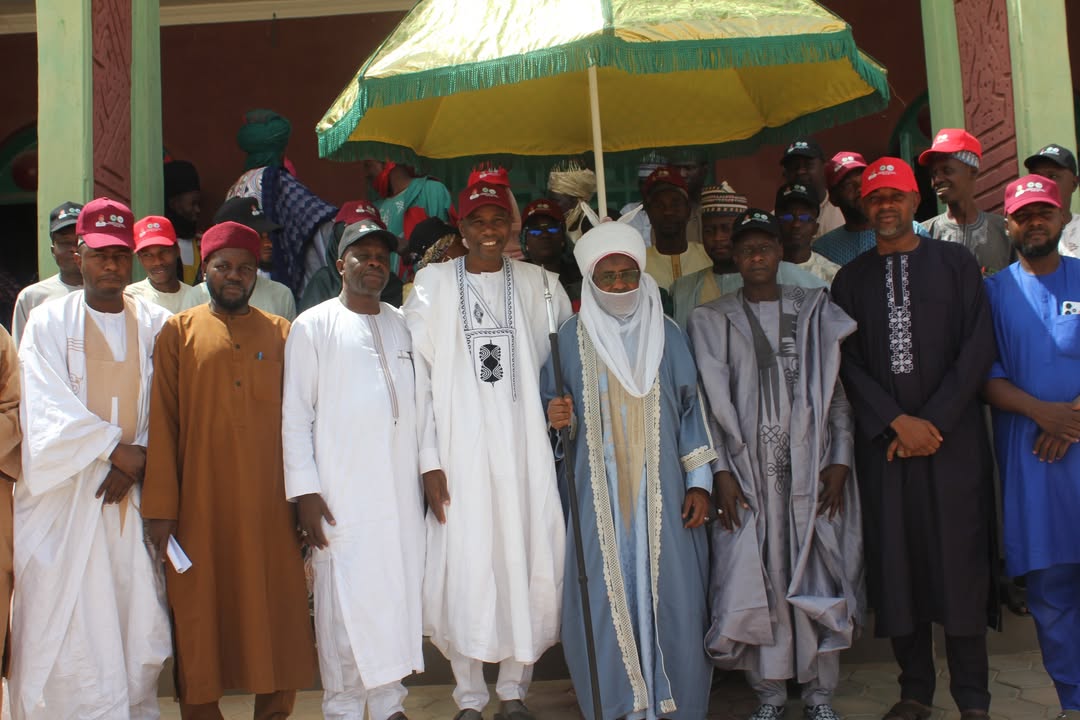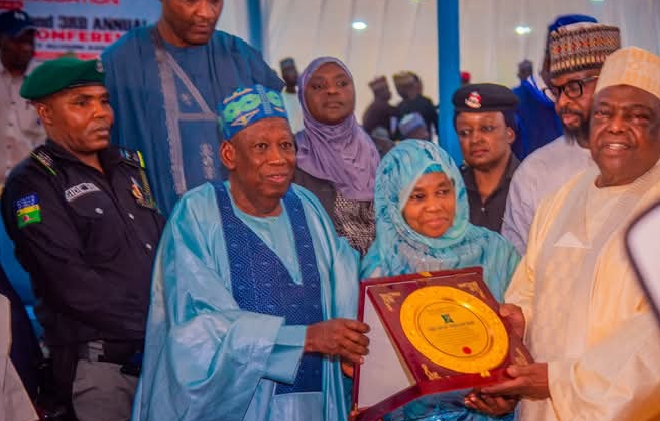Headlines
CSOs unveil campaign against sexual harassment in tertiary institutions

Nasiru Yusuf
Civil society organisations, under the aegis of the Anti-sexual Harassment Advocacy Cluster, have unveiled an Anti-Sexual Harassment campaign to end all forms of harassment against the female gender in places of higher learning.
KANO FOCUS reports that the group have also appealed to President Muhammadu Buhari to consider immediate assent to the Anti-Sexual Harassment bill into law.

A statement by Executive Director Centre for Awareness on Justice and Accountability (CAJA), Kabiru Dakata, on behalf of the consortium, said the appeal become pertinent due to the alarming rates of sexual assault against female undergraduates in Nigeria.
Dakata said the National Assembly has recently passed the Anti-Sexual Harassment Bill into law, the bill seeks to promote and protect ethical standards in tertiary institutions.
According to him, the bill that was sponsored by Sen. Ovie Omo-Agege and 57 other senators in 2016, eventually scaled through in October 2019 after a series of setbacks.
He said thought the passage was facilitated by the famous BBC documentary which exposed two lecturers of the University of Lagos, and a lecturer of the University of Ghana, who was caught in the act.
Dakata said, “70 per cent of female graduates from Nigerian tertiary institutions had been sexually harassed in school, mostly by classmates and instructors, a 2018 World Bank Group survey indicated.
“In the survey conducted in 19 tertiary institutions across six states in Nigeria by the consortium of civil society organisations, including CAJA, Social Action, We the People, and led by Youth Alive Foundation (YAF), lack of clear reporting channels was one of the discouraging factors to report sexual harassment.
“56 per cent of respondents said there were no clear channels to report sexual harassment in their institutions, and they were unaware of any law protecting them against sexual harassment on campus. Also damning, is the lack of a unified law to combat the scourge in all Nigerian higher institutions.”
He added, “Sexual harassment includes unwanted, inappropriate, and offensive sexual advances like repeated and unwanted sexual invitations; insistent requests for dates/dinner/drinks; phone calls, messages, etc., solicitation of sexual activity or other sex-linked behavior by promise of reward (overt or subtle), sexual comments, touching the someone’s body, hair or clothes, standing close or brushing up against another person, kissing sounds, howling and smacking.”
Dakata explained that the launch of the Anti-Sexual Harassment campaign will help address some of the issues outlined and the longer-term objectives of lending its voice toward the timely Presidential Assent to the Anti-Sexual Harassment Bill.
He declared that the bill when signed into law, will also enable the Establishment of the Independent Sexual Harassment Prohibition Committee in tertiary in tertiary institutions and the Formation of the ‘Campaign Against Sexual Harassment (CASH)’ Club.
Members of the cluster include Centre for Awareness on Justice and Accountability (CAJA) Kano State, Youth Alive Foundation (YAF) Abuja, Village Debbo Care Initiative (VDCare) Kaduna State, Sefjamil Media and Development (SMD) Kano State, Joint Association of Persons with Disability (JONAPWD), Gombe State Chapter, Women`s Rights and Health Project (WRAHP) Lagos State and Connected Development – Akwa Ibom State (CODE).
This Project is supported by the strengthening civic advocacy and local engagement (SCALE) project through the United States agency for international development (USAID). The contents of this message are the sole responsibility of the Anti-Sexual Harassment Advocacy Cluster and do not reflect the views of the United States government.

Headlines
Kano AGILE renovates 1,300 schools, enrolls 30,000 girls in three years

Aminu Abdullahi Ibrahim
The Kano State Ministry of Education’s Adolescent Girls Initiative for Learning and Empowerment (AGILE) Project, supported by the World Bank, has successfully renovated over 1,300 senior and junior secondary schools in the state in the last three years.
KANO FOCUS reports that the state commissioner for education, Alhaji Ali Haruna Makoda, disclosed this during a visit to the Karaye Emirate on Tuesday.

He added that the AGILE program has enrolled more than 30,000 girls through targeted outreach, grants, and its Second Chance education initiative.
Makoda further revealed that the state government has finalized plan to construct 130 new schools in rural communities, with over 35,000 girls already benefiting from financial assistance under the scheme.
He urged the Karaye Emirate to lend full support to the program and prioritize girls’ education.
In his remarks, the Emir of Karaye, Alhaji Muhammad Maharaz, pledged the emirate’s commitment to advancing girls’ education in Kano State.
He commended the state government and the commissioner for their dedication to the programme’s success.
“It is our collective responsibility to support this initiative,” the Emir stated, calling for measures to ensure beneficiaries complete their education with strong academic outcomes.
The commissioner’s delegation consist of the Kano State AGILE Project Coordinator, Malam Mujitapha Aminu and other members of State Programme Implementation Unit (SPIU).

Headlines
BUK Faculty of Education celebrates 50 years anniversary, launches Alumni Association

Aminu Abdullahi Ibrahim
Bayero University Kano (BUK) on Monday celebrated the 50th anniversary of its Faculty of Education and inaugurated its Alumni Association at the Convocation Arena of the university’s new campus.

KANO FOCUS reports that the event was graced by government officials, education stakeholders, and alumni all gathered to commemorate the faculty’s contributions to Nigeria’s educational sector.
In her keynote address, the State Minister for Education, Mrs. Suwaiba Sa’id Ahmad announced the Federal Government’s Sector Renewal Initiative designed to transition Nigeria from a resource-based to a knowledge-based economy.
She highlighted that the aim of the renewal initiative consists of – Reducing the number of out-of-school children; combating learning poverty; nhancing skills development and human capital for the labor market
The minister noted that the initiative prioritizes Technical and Vocational Education and Training (TVET); Science, Technology, Engineering, and Mathematics (STEM); Digital literacy and education quality assurance.
Mrs. Ahmad disclosed that the Federal Government had disbursed ₦35 billion to 261 beneficiaries under the Nigerian Education Loan Fund (NELFUND), with BUK among the top beneficiaries.
“So far, the scheme has received 420 applications, and we are scaling up investments,” she stated.
She further confirmed that President Bola Ahmed Tinubu approved ₦120 billion to boost TVET programs, with plans to train 650 youths in technical, vocational, and digital skills over the next two years.
Emeritus Professor Sani Ahmad Sufi, former Permanent Secretary of the Ministry of Education, praised the faculty for its high-quality graduates.
“Our pride lies not just in the number of graduates produced yearly, but in their impact across Nigeria and beyond,” he said.
He added that the faculty has produced Nigeria’s largest pool of graduate teachers many of whom hold key positions nationally and internationally.
The National Chairman of the All Progressives Congress (APC), Dr. Abdullahi Umar Ganduje applauded the faculty for its significant role in advancing education in Nigeria.
The event concluded with awards presented to distinguished alumni and supporters of the faculty in recognition of their contributions to its growth.

Headlines
Governor Yusuf Champions Education, Resolves Certificate Crisis for Kano Graduates

Kano State Governor Abba Kabir Yusuf has emerged as a beacon of hope for graduates left stranded due to the previous administration’s negligence regarding academic certificates.
His determination to rectify these injustices has culminated in decisive actions to secure the future of Kano’s youth. Ibrahim Adam, the Special Adviser to the Governor on Information, shared these developments with the media.
On December 9, 2024, Governor Yusuf traveled to Cyprus with a mission to obtain the overdue academic certificates for Kano students affected by the prior administration’s failure to meet its educational financial obligations.
During a critical meeting with the management of Near East University, the governor focused on facilitating the release of certificates for students who graduated between 2015 and 2019, particularly in essential fields like Medicine and Nursing.
This was confirmed by Sunusi Bature Dawakin Tofa, the governor’s spokesperson.

In a significant move, Governor Yusuf has settled the outstanding fees of €1.4 million (approximately ₦2.5 billion) owed to the university for 84 medical and2015 to 2019.
This substantial financial commitment honors the dedication and hard work of these graduates, restoring their hopes for a future that had previously been unjustly delayed.
According to Ibrahim Adam, the certificates are set to be handed over to the Kano State Scholarship Board through the Nigerian Ambassador to Turkey, marking a pivotal moment for the affected students.
Governor Yusuf acknowledged the challenges faced by the graduates, declaring, “This situation has been a significant setback for our children, hindering their dreams and aspirations, and it has also affected our state, which is in dire need of their expertise.”
His vision for a prosperous Kano is centered on prioritizing education, ensuring that talented individuals can make valuable contributions to the state’s advancement.
The governor’s proactive measures not only address the systemic issues in the education sector but also inspire renewed hope among Kano’s youth.
By fulfilling his promises, he emphasizes the crucial role of supporting young people in achieving their aspirations, which is vital to the state’s growth.
As this milestone is celebrated, it is evident that Governor Abba Kabir Yusuf’s relentless pursuit of educational reform signals a transformative era for Kano State.
His administration’s unwavering focus on education stands as a vital investment in the futures of individuals and the overall development of the state.
Under his leadership, Kano State is poised to realize its full potential, with eager graduates ready to make impactful contributions to their communities.
Governor Yusuf’s commitment to empowering the youth serves as an enduring reminder that with dedication and decisive action, a brighter future is attainable for all.














